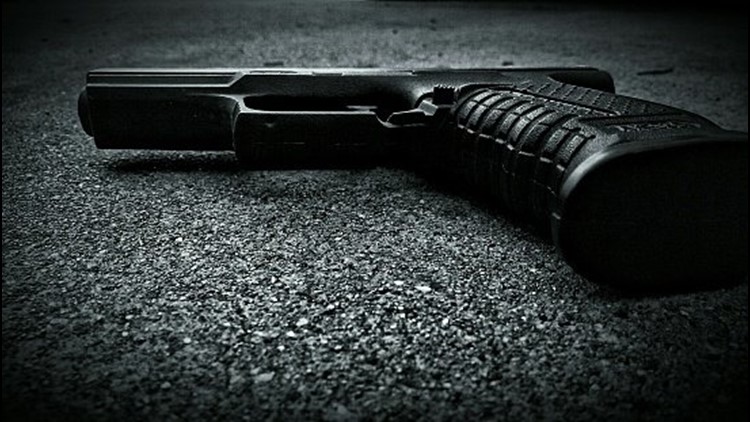LAWRENCE, Kan. (CBSNews) — It’s legal, starting Saturday (July 1), to walk down the middle of Kansas’ serene Midwestern campus with a hidden firearm. The carrier will need neither a permit nor training.
Never mind the implications of the peacefully titled Personal and Family Protection Act that goes into effect this week after years of arguing, hand-wringing, lobbying and national attention. Never mind Kansas now having some of the least restrictive gun laws in the country.
David Beaty knows enough about the impending law. He knows football culture and football players better.
“It is a deal that I will be very adamant about in a way of banning [guns],” Kansas third-year coach said. “I don’t want weapons around for our team. I know it’s a bad, bad deal for us.
With that stance, Beaty may soon be in violation of the new law. The so-called “campus carry” law is a legal trend that threatens to bump up against how a coach runs his program.
“Our kids are still 16-, 17-, 18-years-old. A lot of them don’t know anything about firearms,” Beaty said. “Just because you can [carry one] doesn’t mean you should.”
The Kansas law requires concealed carriers to be 21. That stipulation alone, advocates say, limits the legal gun-carrying population on campus to only a few hundred.
In the state of Texas, it is legal to openly carry a firearm. When campus restrictions on handguns were lifted, University of Texas students protested by attaching sex toys, which can be illegal, to their backpacks to protest concealed carry, which is legal.
The so-called “Cocks Not Glocks” movement made national news.
Social activist Harry Edwards ended his association with the University of Texas over the state’s concealed carry law.
“It’s a little scary,” said Kansas State athletic director Gene Taylor.
Garden City Community College coach Jeff Sims says he’s had one gun-related incident in 22 years of coaching.
“You kind of gotta roll with society,” Sims said. “That’s what our society has decided their law is, and you just adjust.
To comply with the law, Kansas athletic officials will be required to construct elaborate detection devices at every entrance to historic Allen Fieldhouse and Memorial Stadium, complete with an armed guard.
“Beware of the Phog” may turn into “Beware of the Firearm.”
Oklahoma State coach Mike Gundy stresses no guns, no alcohol, no violence against women and an adherence to academics from his athletes. That’s fairly boilerplate for scores of coaches until lately.
“I think most of that is coming from where our world is now,” said Cowboys wide receiver James Washington, an avid hunter. “With all the shootings and things like that, it really changes people’s minds.”
Gundy regularly stresses to his players that “you don’t need a gun to live in Stillwater.”
“I was in college, been to a bunch of parties, been around a lot of football players,” the coach said. “Moderation that should have been part of what we did, wasn’t. It was college, we were dumb.If you throw a gun in the mix, it’s not good. You make poor decisions. When you have a gun there, you have a chance to make a decision you can never make up for.”
KU officials said there were only six weapons-related incidents on campus between 2006-15.
“Personally, I felt like we’re less likely to have a mass shooter come in than we are have a suicide happen in a residence hall or accidental discharge,” a campus official said during an informational forum on the law earlier this year.
Nevertheless, Kansas became a flash point when Gov. Sam Brownback signed the latest version of the law in 2015. A combination of conservative state government and NRA lobbying led to a concealed carry law that extended onto campuses.
“Law-abiding citizens have the right to defend themselves. If a college campus doesn’t provide adequate protection for students, Kansas law now ensures they can defend themselves …”
As July 1 approached, it wasn’t until earlier this month that it was decided guns would be banned from Kansas public hospitals and mental health facilities.
Campuses are meant to be peaceful enclaves of introspection, deep thought and learning — not wondering whether the librarian has “Romeo and Juliet” or a Smith & Wesson.
That brings up the sticky situation of coaches’ laws vs. society’s laws. While he was at Texas, coach Charlie Strong banned guns even though concealed carry was allowed on campus. A Texas spokesman said Strong had the right to ban legal gun owners from bringing them to football functions or football facilities.
When Missouri‘s Barry Odom mentioned his no-guns policy, state legislators came down hard. Odom has since clarified his stance.
No charges were filed by a seemingly friendly Louisiana district attorney after Alabama All-American Cam Robinson was arrested for felony possession of a stolen firearm.
That begs the question: Why does any athlete need a gun, much less a stolen one?
It’s only been during the professional career of current coaches that they’ve even had to consider guns — or rather, banning them. Such is our society now.
In the state of Kansas right now, they can’t even do that.
Kansas basketball coach Bill Self called the law “unbelievable.” He did not elaborate.
Beaty said it was only a coincidence his team, at the moment, is being taught a different kind of weapons training.
“We are training our kids right now specifically on what to do when they are pulled over on a traffic stop,” Beaty said. “Where their hands go, how their hands go, how they speak, what they tell their policeman about what’s in the car.
“We’re not taking anything for granted because we don’t want to lose one of our babies.”
(By Dennis Dodd, CBS Sports Senior Writer)



